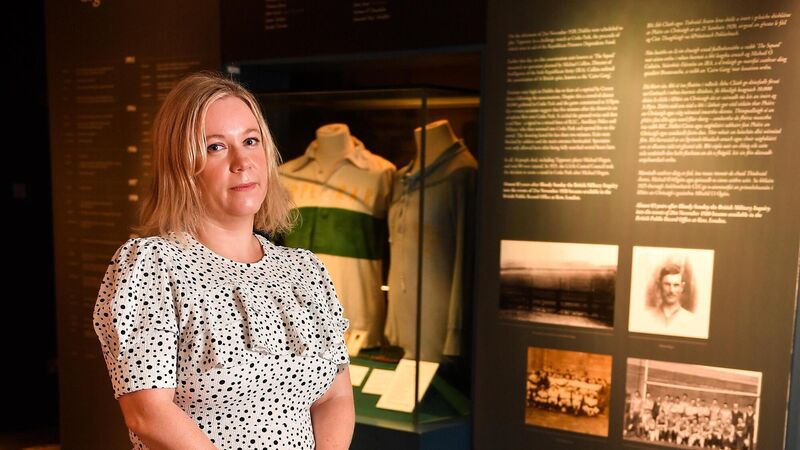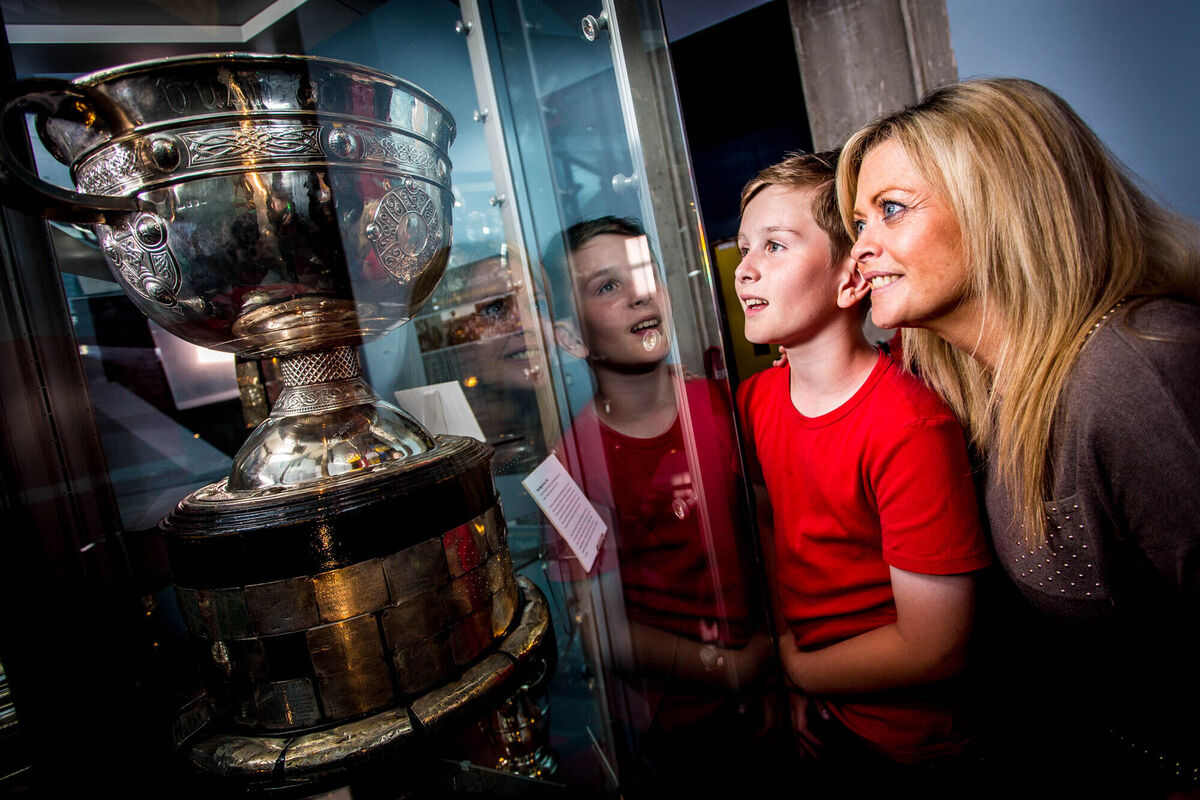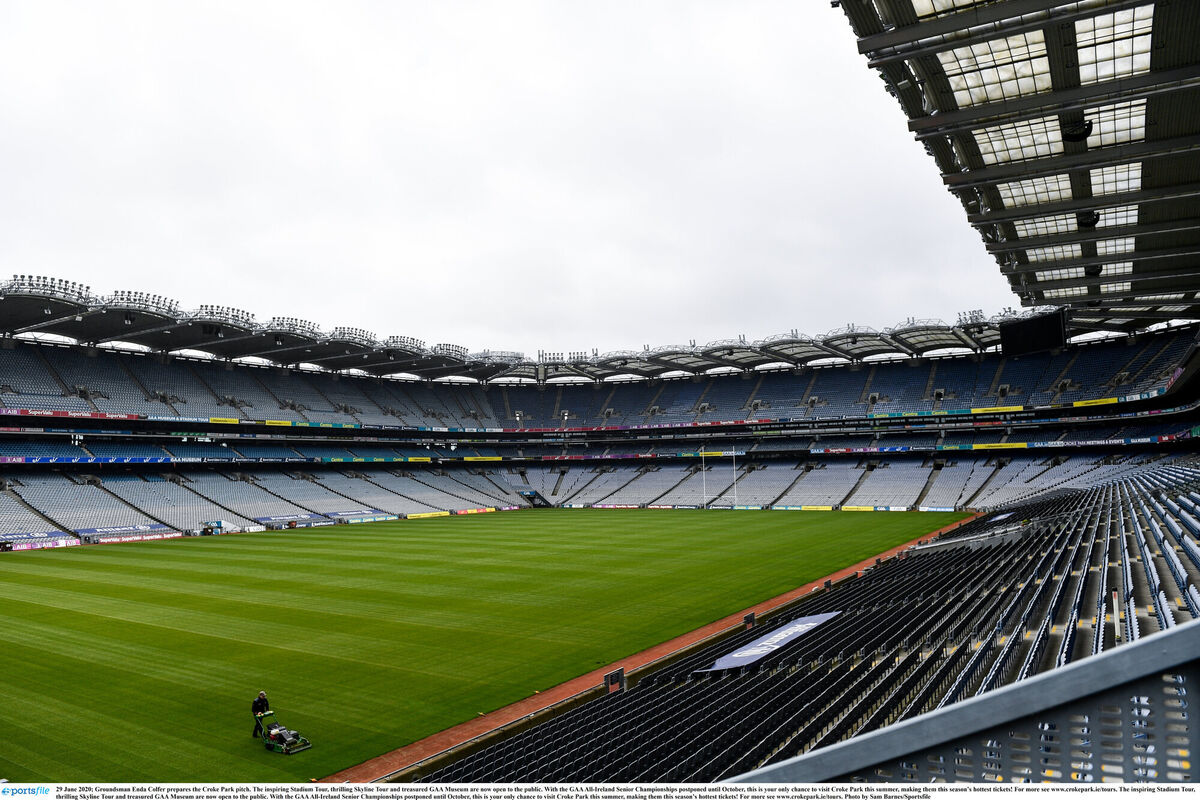The GAA Museum remembers Bloody Sunday 100 years on

The GAA Museum remembers Bloody Sunday 100 years on: GAA Museum Events Manager, Julianne McKeigue, a descendent of Tipperary footballer Michael Hogan who was killed during the Bloody Sunday attack.
As a young GAA fan who regularly sat in the Hogan Stand, Julianne McKeigue knew it was named after a grand-uncle who lost his life in the Croke Park Bloody Sunday massacre 100 years ago.
However, this terrible chapter in her family history didn’t fully impact on her until she did a Leaving Certificate history project about it.
In one of those interesting twists, Julianne now works as Education & Events Manager at the GAA Museum at Croke Park, helping to organise a packed programme of colourful commemorative events to mark Bloody Sunday over the coming months. The package includes talks, tours, a new exhibition, and a community programme.
November 21, 1920 or, as it became known, Bloody Sunday, was the darkest day in the history of the GAA and a pivotal day in the Irish War of Independence.
On that day, 16 British intelligence agents were shot dead and five injured in Dublin city by Michael Collins’ IRA squad.
Later that evening as thousands gathered at Croke Park to watch a challenge match between rivals Dublin and Tipperary, the RIC and British military surrounded the grounds and opened fire on the crowd in retaliation.

Julianne’s grand-uncle, 24-year-old Tipperary footballer Michael Hogan and 13 spectators lost their lives. More than 60 were injured. Later that evening, two high-ranking Dublin IRA Officers, Dick McKee, Peadar Clancy, and Irish language enthusiast, Conor Clune, were also killedin Dublin Castle. Bloody Sunday marked a decisive turning-point in the military struggle between the British forces and the IRA.
“My grand-uncle was the only player to die in Croke Park that day. It’s amazing that I've ended up working here in the GAA Museum as Events and Education manager,” ponders Julianne, who explains that while she always knew of Croke Park’s Bloody Sunday and of how her mother’s uncle had died, she never experienced the full impact of the story until she researched it herself as her Leaving Certificate history project.
“We were GAA fans as a family, we went to Croke Park; I always knew the Hogan Stand was named after my grand-uncle, but when you’re young you don’t really ‘get’ it,” she says now.
“For my Leaving Certificate project, I focused on Bloody Sunday and that was probably the first time I went into it in an in-depth way and got a real feeling for what happened to Michael and all the other 13 13 victims who were killed that day.
“They just went to watch a match and never came home. This is why anniversaries are so good – it’s important to remember what happened so that people are informed,” she says, adding that she is glad the Department of Education rowed back on controversial plans to downgrade the teaching of history at Junior Cycle.

“It’s important that these anniversaries are commemorated so people will know what went before.
“It’s important for all the families who lost loved ones on that day,” she says, adding that hearing the personal stories of those who died that day, brings the victims to life as real people.
“Michael Hogan was nervous because he was marking the best player on the Dublin team — and he told one of his team-mates that he was nervous about it. He was only 24.
“It’s those stories that really hit home when I started studying Bloody Sunday for the history project. As a family, we lived with it. My mother says they didn’t talk about it a lot, except on the anniversary.
“That time there was so much horror that people ended up just getting on with it.
“That project really woke me up,” says Julianne who went on to study journalism and marketing at third-level.” she says, adding that she was also strongly affected by sports-writer Michael Foley’s book The Bloody Field, which details the massacre and the personal stories of those who died.
“This was another time when I felt the very real, personal extent of what happened. “
As the national custodian of the archives and artefacts of the Gaelic Athletic Association, the GAA Museum this summer unveiled a diverse and sensitively curated series of events entitled ‘Remembering Bloody Sunday.’ The programme includes talks, tours, a new exhibition, and a community programme running until November 2020 and possibly beyond. A focal point for the centenary commemorations will be a new Remembering Bloody Sunday exhibition at the GAA Museum, which is due to open around the end of September.

The display will explore the tragic events of the fateful day and their impact on Irish history through artefacts, newspaper reports, official documents, photographs, and victim stories. The exhibition will include a specially commissioned Bloody Sunday centenary painting by artist David Sweeney, a former Dublin GAA senior hurling captain and the GAA’s eLearning Manager at Croke Park.
The GAA Museum is also running special weekly commemorative Bloody Sunday guided tours of Croke Park which will take visitors through the sequence of events on the fateful day and discuss the impact Bloody Sunday had on both the GAA and Ireland itself.
In addition, a weekly evening ‘Mondays at the Museum’ lecture series with leading historians will examine Bloody Sunday from every angle, bringing thought-provoking discussion on a diverse range of topics. This runs on Mondays from 14 September.
A special edition of RTÉ Radio One’s will also take place at the GAA Museum on Saturday 14 November, focusing on Croke Park, the GAA, and the events around Bloody Sunday.
The GAA Museum has also teamed up with History Ireland to host one of their Hedge Schools, titled ‘History, Memory & Bloody Sunday’. Taking place in the museum on November 18, this offers a lively round-table discussion with historians and well-known personalities.
Later this year, or possibly next year, a community-based creative writing project With Fighting Words will run a series of workshops for local older residents involving conversations to uncover a more personal history of the area and its people over the last 100 years. Participants will discuss the general history and accounts of Bloody Sunday that may have been passed down through generations. The process will culminate in the creation of a book capturing the stories, co-written by those who take part.
The programme will include talks, tours, a new exhibition, and a community programme running until November 2020. For full details and advance online ticket sales, see www.crokepark.ie/BloodySunday





